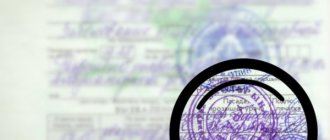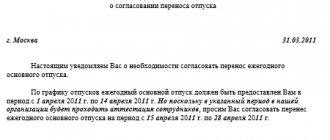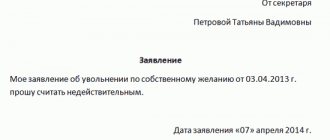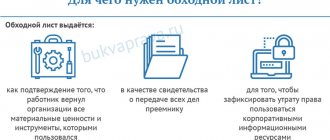- Types of disciplinary sanctions Reprimand as a disciplinary sanction
- Remark as a disciplinary sanction
- Dismissal as a disciplinary sanction
If facts of violation of labor discipline are established, disciplinary action can be applied to any employee of the organization. This possibility is established by various regulations governing labor legislation, including the Labor Code, disciplinary statutes (for example, “On the Armed Forces of Russia”), laws (for example, “On Civil Servants”) and other documents. The decision on disciplinary liability is made by the head of the enterprise or another person entrusted with this responsibility. What a disciplinary sanction is, how it is imposed and lifted, what types of liability are commensurate with a specific offense, and other similar issues will be discussed in this article.
Disciplinary sanctions: concepts and categories
Disciplinary action means a punishment imposed for a disciplinary offense, that is, for a case where, as a result of an employee’s guilty actions, his functional duties were not performed or were performed improperly.
The Labor Code of the Russian Federation does not imply mandatory punishment, since putting sanctions into effect is the right of management, not an obligation.
Article 192 of the Labor Code of the Russian Federation allows the use of three types of punishment:
- comment;
- rebuke;
- dismissal for appropriate reasons.
Labor legislation defines the types of punishment, but the method of choosing them is not clearly defined anywhere. When it becomes a question of issuing a reprimand, and when it is better to issue a reprimand, is determined by the manager.
Other penalties are not established by law and cannot be used. An exception is made for employees of special industries, for whom additional types of penalties are prescribed. This is due to the specifics of labor functions and the possibility of particularly severe consequences due to an error. These are three broad categories:
- employees with special status: judges, prosecutors, civil servants (military personnel, state civil servants);
- employees of law enforcement agencies (internal affairs bodies, customs authorities, etc.);
- workers operating in industries related to the operation of means of production with increased danger (transport, radiation-related, etc.).
For certain categories of employees, charters and regulations on discipline approved by federal laws, the President and the Government of the Russian Federation may apply. In particular, the Regulations on the discipline of railway transport workers of the Russian Federation (approved by Decree of the Government of the Russian Federation dated August 25, 1992 No. 621), the Charter on the discipline of employees of organizations operating particularly radiation-hazardous and nuclear-hazardous production facilities and facilities in the field of the use of atomic energy (approved by the Federal Law dated 8.03 .2011 No. 35-FZ), Charter on the discipline of maritime transport workers (approved by Decree of the Government of the Russian Federation of May 23, 2000 No. 395), Disciplinary Charter of the Customs Service of the Russian Federation (approved by Decree of the President of the Russian Federation of November 16, 1998 No. 1396). These regulations establish requirements for labor discipline in the relevant industries, related to the peculiarities of their functioning.
For example, for a mistake by an employee in the field of atomic energy use, the following measures may be applied:
- severe reprimand;
- warning about incomplete compliance with the position held or work performed;
- termination of an employment contract for a one-time commission of one of the violations provided for in Article 61 of the Federal Law of November 21, 1995 N 170-FZ “On the Use of Atomic Energy”, if the consequences of such a violation pose a threat to the safe operation of the operating organization and pose a danger to life and the health of citizens and the environment.
Information about punishments is not recorded in the employee’s work book and personal card, except in situations of dismissal for a violation. Other penalties are removed from the employee over time, so they cannot be recorded in a personal document.
The Labor Code of the Russian Federation does not provide for the imposition of fines, but they can be expressed in the form of deprivation of bonuses, full or partial. If the company’s remuneration system involves the payment, in addition to the salary, of an additional bonus, the local act must specify the criteria for calculating and withholding incentive payments. Deprivation of bonuses can be used either in conjunction with a reprimand or reprimand, or independently, for less significant omissions. In the second case, there is no need to provide a formal disciplinary procedure. It is enough to issue an order that clearly explains why a particular person is not entitled to a bonus. It is recommended to avoid the words “deprive” and “deprive of bonus.” It is better to stick to positive language, such as “pay a premium of 5%.”
Since the bonus is an incentive payment, its deprivation does not indicate the imposition of punishment on the employee, but only indicates the absence of grounds for rewarding such an employee.
Appeal ruling of the Investigative Committee for civil cases of the Trans-Baikal Regional Court dated October 15, 2013 in case No. 33–3683–2013
Rules for the use of disciplinary sanctions
Punishment is possible within a month after the discovery of the offense, but no more than six months from its commission. When calculating the monthly period, periods when an employee is on sick leave or on vacation, as well as time for taking into account the opinion of the trade union, are not taken into account. The law does not explain where the month should be counted from; let us turn to the practice of the courts. They are of the opinion that the “day of discovery of the misconduct” is the day when one of the managers learned about the violation. But if the offense was committed more than six months ago, it’s time to forget about punishment.
However, if an error was discovered during the process of audit, audit or inspection of financial and economic activities, the period for the possibility of approving the punishment is two years from its commission.
When carrying out punishment, the fundamental principles of legal responsibility must be followed:
- The principle of the legality of disciplinary liability is the requirement to bring to responsibility only for a guilty, unlawful act and only within the limits established by law.
- The principle of fairness of disciplinary liability establishes the nature of disciplinary sanctions, establishing the need for punishment to correspond to the degree of guilt and the severity of the offense committed, excluding the possibility of increasing the penalty based on the results of consideration of the complaint of the employee subjected to punishment, and providing for responsibility for one’s own actions. The principle also includes the requirement of one legal penalty per offense. When imposing a disciplinary sanction, the severity of the offense committed and the circumstances under which it was committed must be taken into account (Part 5 of Article 199 of the Labor Code of the Russian Federation).
- The principle of expediency presupposes strict individualization of responsibility, taking into account, when choosing a measure of responsibility, the personality traits of the offender, the type and nature of his activities. This principle is also expressed in the possibility of release from punishment and early removal of a disciplinary sanction.
- The principle of inevitability of responsibility means that not a single disciplinary offense should remain outside the purview of the employer (or his representative). The implementation of the principle of inevitability of responsibility should be enshrined in the obligation to initiate a disciplinary case for each case of violation of labor discipline. This in itself will have great preventive significance, regardless of whether the disciplinary proceedings end with the stage of implementation of disciplinary liability or, taking into account the identity of the offender and the circumstances of the commission of the disciplinary offense, it is terminated before it. The application of a disciplinary sanction to a person who has committed a disciplinary offense can only be applied one times, i.e. for one disciplinary offense, one disciplinary sanction.
- The principle of the speed of onset of disciplinary liability, which is closely related to its goals - general and specific prevention, finds practical expression in establishing deadlines for imposing penalties, in establishing the requirements for prompt resolution of issues of bringing an employee to disciplinary liability. The principle in question stimulates the activities of the employer (his representative) in the timely application of disciplinary sanctions and helps to strengthen the educational impact of disciplinary punishment.
- The principle of humanism is implemented in a careful approach to the matter, taking into account additional circumstances, the onset of consequences (impact on production and the team), which have a cause-and-effect relationship with the violation itself. The circumstances under which the violation was committed and the degree of guilt of the employee are also of great importance. Taking these circumstances into account, it is necessary to understand the external factors that prompted the employee to take a certain action (the behavior of colleagues, accident prevention, acts of force majeure, etc.) and his intent and attitude towards what happened. You also need to take into account the employee’s previous work and behavior; his attitude towards work; personal qualities and, sometimes, health status.
Disciplinary proceedings consist of successive stages:
- Before applying a disciplinary sanction, it is necessary to document the fact of violation of labor discipline - such evidence can be a memo from the employee’s immediate supervisor, a memorandum from his subordinate, an act drawn up by witnesses to the violation and other documents.
- Request a written explanation from the employee (before applying a penalty).
- Draw up an appropriate act if, after two working days, the employee has not provided a written explanation (and the employee’s failure to provide written explanations is not considered an obstacle to applying a disciplinary sanction).
- Calculate the time period from the moment of discovery, as well as from the moment the employee committed a disciplinary offense.
- When applying a disciplinary sanction, take into account the severity of the disciplinary offense committed and the circumstances under which it was committed (Article 192 of the Labor Code of the Russian Federation), as well as the fact that only one disciplinary sanction can be applied for each disciplinary offense.
- Familiarize the employee, against signature, with the order (instruction) on the application of a disciplinary sanction within three working days from the date of its issuance.
- Draw up an appropriate act if the employee refuses to familiarize himself with this order (instruction) against signature.
- It should be noted that if an employee does not agree with a disciplinary sanction, he can appeal it to the state labor inspectorate and (or) bodies for the consideration of individual labor disputes.
To identify all the circumstances of the case, as well as the position of the “offender” himself, it is necessary to familiarize himself with the employee’s explanations in writing
Documenting the fact of violation
Logically, the first step is to document the illegal act. This is not required by law. It is allowed to hold an employee accountable because of the neglect of discipline itself, and not because of its formal confirmation. So, in the absence of recording an illegal action, the algorithm for imposing punishment is not violated. However, if there is no official record of the violation, it is more difficult to prove the event in a labor dispute. You can use witness testimony, software data, audio and video recordings, etc.
The presence of documentary evidence of a violation committed by a subordinate is advisable to facilitate the evidentiary procedure. The Labor Code of the Russian Federation does not establish specific documents drawn up for these purposes. Therefore, organizations can arbitrarily determine it. This could be an act of violation of discipline, a report, an official note, etc.
The act of disciplinary offense shall indicate: the name of the organization; name of the document type; date of; document registration number; place of compilation; title to the text; text; signatures of the persons in whose presence the act was drawn up. The text of the act indicates what disciplinary offense was committed by the employee, under what circumstances it was established, the employee’s behavior in this case and other relevant circumstances.
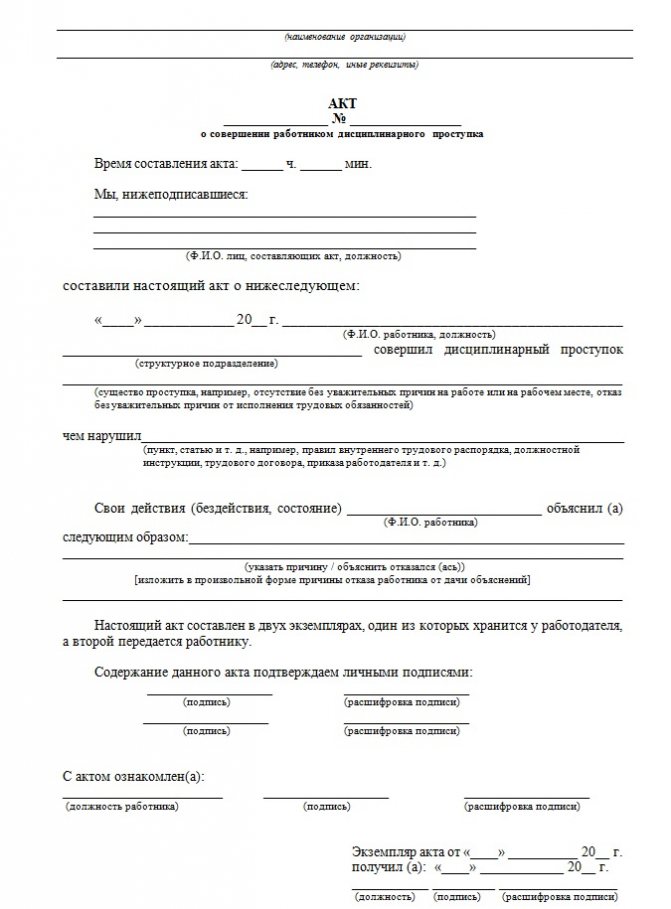
The act is drawn up in any form or on a stencil form
The report is prepared by the boss of the offender based on his explanations. In addition to the immediate contents of the presentation, the department, type of document, title, to whom the report is addressed, the date of preparation, and signed by the author are indicated. Memos are also prepared. Today, they are considered as an analogue of reports - only the name of the type of document is changed, but the rules for drawing up are the same.
The law does not establish a time limit for recording the act; this can be done at any time, even after requesting an explanatory statement from the violator.
Registration of an employee appearing in a state of intoxication
Official registration of a state of intoxication requires separate consideration. The best way to prove this incident may be a medical examination, but a person has the right not to agree to it.
The employee’s state of intoxication can be confirmed both by a medical report and other types of evidence, which, in the event of a dispute about the legality of dismissal, must be assessed accordingly by the court.
clause 42 of the resolution of the Plenum of the Supreme Court of the Russian Federation dated March 17, 2004 No. 2
Avoiding a medical examination will not interfere with dismissal. On the contrary, the court may perceive this as the employee’s agreement with his condition and desire to evade responsibility. Testimony of witnesses, explanatory notes, official notes from the boss, an act on the employee being in a state of intoxication, etc. can prove that a person appears intoxicated.
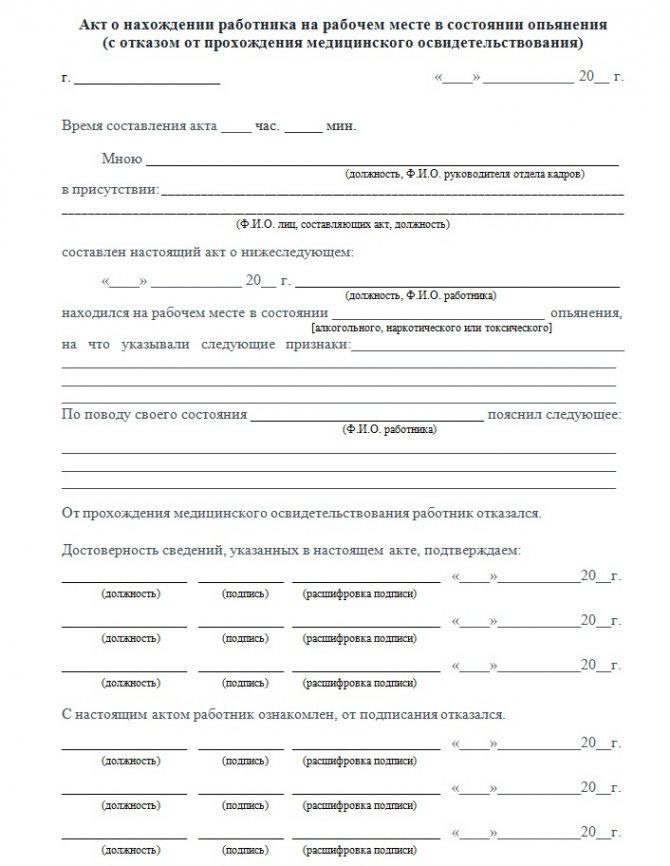
If an employee who appears at work in a state of intoxication refuses to sign the act, after noting this, the drafters of the act sign again
The act is in free form and is signed by eyewitnesses and the manager. It is necessary to record the date and time of the document formation, full name and position of the offender, the type of intoxication, symptoms proving this (for example, the smell of alcohol when exhaling, abnormal coordination of movements, unsteady gait, acceleration of diction, rapid change of associations and mental primitiveness, reduced criticism of one’s own actions and speech, etc.). If a person has been suspended from work in accordance with Art. 76 of the Labor Code of the Russian Federation, was sent for a medical examination, refused it, this should also be recorded in this act.
How can an employer cancel a reprimand?
It happens that the employer comes to the conclusion that the employee was punished unlawfully and wants to remove the reprimand from him. How can I do that?
Very simple. All that is required to cancel a reprimand is to issue an appropriate order from the head of the company. It can be drawn up at any time (Article 194 of the Labor Code of the Russian Federation). The order to remove the reprimand must contain a reference to the order to issue the reprimand, indicating its date and number. You can see a sample order to remove a reprimand in the ConsultantPlus system. To do this, sign up for a free trial access to the system.
The employee himself or his immediate superior can also apply to have the reprimand lifted.
A sample of drawing up a petition to lift a disciplinary sanction was prepared by K+ experts. Get a free trial access to the system and proceed to the sample.
An employee is considered to have a disciplinary sanction after it has been issued for exactly 1 year, if during this time he does not commit other offenses, followed by other disciplinary sanctions (Article 194 of the Labor Code of the Russian Federation). In this regard, there is one more option for removing a reprimand from an employee - wait for its automatic cancellation.
Receiving a written explanation
Before applying a penalty, it is necessary to require the employee to write an explanatory note.
It is necessary to ensure objectivity in the interpretation of facts and prevent groundless measures. The law does not establish a method for requesting explanations; it is chosen independently. For the courts, it is sufficient for the employee to have an explanatory statement to demonstrate the fulfillment of this managerial responsibility.
An employee can explain his behavior, but is not obliged to do so, and the employer is only obliged to demand an explanation. If they are not provided, it is not considered an offense. However, in a legal dispute, the employer must confirm that an interpretation of the situation was requested from the employee, otherwise the order of punishment is considered illegal.
The following will help you prove your claim:
- documents indicating the request for a written explanation, signed by the employee or received by him by mail;
- acts recording the fact of requesting explanations;
- witness statements of persons who signed the acts and other employees.
In addition, an act of failure to provide explanations will serve as evidence, but only if it contains a separate indication of the date of their request.
It has been established that the “suspect” must provide his vision of the situation in writing. If oral explanations are received, you still need to wait two working days for their presentation on paper.
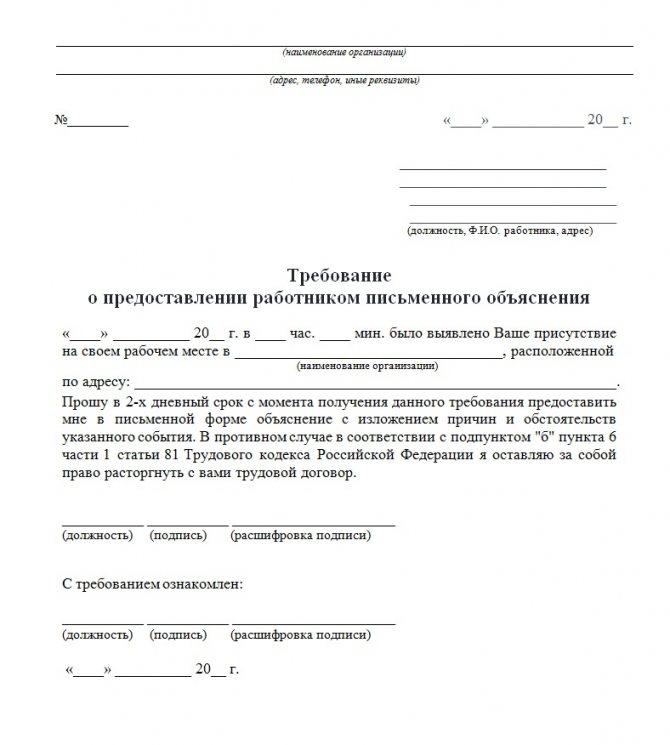
Receiving an oral explanation does not relieve the employer from the need to provide evidence of requesting written explanations from the employee.
If an employee is not present, it is not prohibited to request an explanation by mail or telegram to the address in his employment contract and personal file.
If the registration address in the passport and the actual place of residence are different, the request should be sent to all addresses.
There are precedents for the court to reinstate a violator in his position, due to the fact that a receipt for sending a letter is not considered proof of the requirement to provide an explanation for his illegal actions. It is more reliable to send to the offender:
- a valuable letter with an inventory of the contents and a notification of delivery;
- telegram. It should be sent with acknowledgment of receipt, as well as with the obligatory receipt of a certified copy by telegraph.
Transfer of the document to the employer
The law does not establish a uniform content for this note. Its name doesn't matter. However, when an explanation is provided independently, without a request from management, what becomes most significant is the presence of a reflection of the subordinate's assessment of the incident that occurred. If only the offense itself and accompanying details are described, and it is impossible to understand the person’s position regarding his guilt, this note is not suitable and the manager must still request an explanatory note.
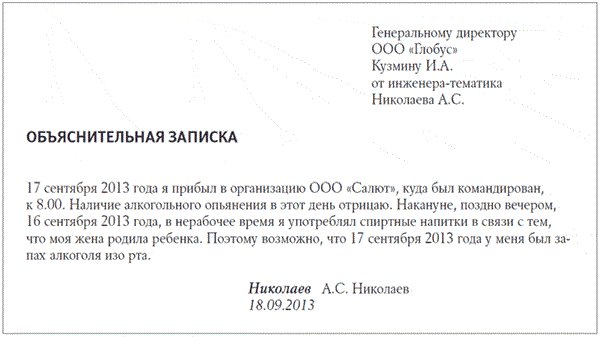
Since requesting an explanation from an employee is necessary for an objective assessment of the circumstances of the violation, it is the availability of the employee’s explanations that allow such an assessment to be made
If the violator does not provide an explanatory note two working days after it is requested, a report about this is drawn up.
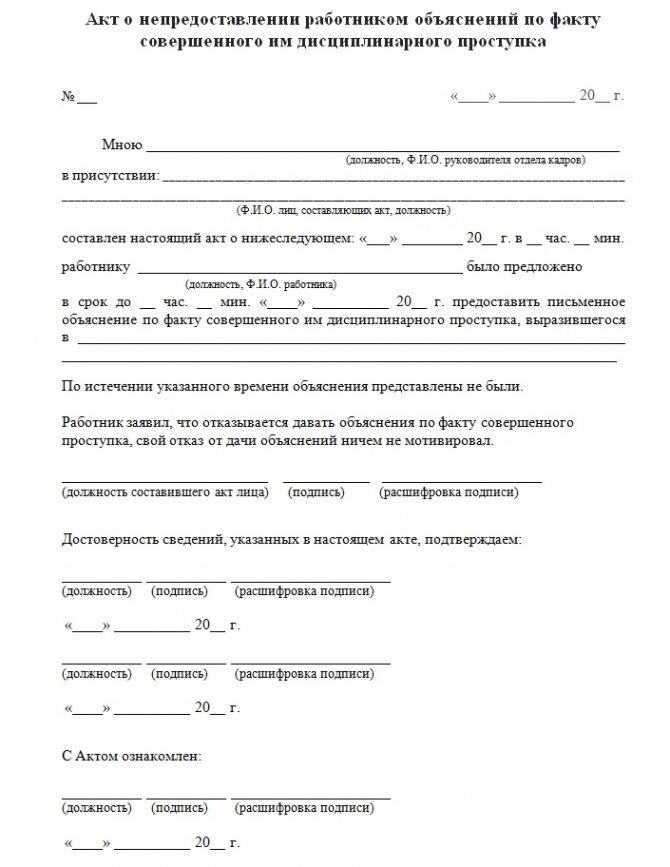
To draw up a report on the employee’s failure to provide an explanation, you need to wait until the expiration of a two-day period
Failure by the offender to provide explanations will interfere with punishment. The act is written arbitrarily, signed by colleagues who were present at the refusal. It is advisable that there be at least three of them.
Order of disciplinary action
The order is issued at the final stage of the punishment process.
- After the measures aimed at ensuring that the employee exercises his right to give a written explanation of the alleged offense have been completed, an order can be issued. Accordingly, an order to apply a disciplinary sanction is issued after the employer receives one of the following documents: an explanatory note from the employee or an act on the employee’s failure to provide an explanation (on the employee’s refusal to give a written explanation). An order to apply a disciplinary sanction in the form of a reprimand or reprimand is issued in a form developed by the employer. If the employee is subject to disciplinary action in the form of dismissal, the order for disciplinary action will be the dismissal order itself, drawn up on the form usually used by the employer to formalize the termination of the employment relationship. If the employer continues to use the unified forms approved by Resolution of the State Statistics Committee of Russia dated January 5, 2004 No. 1, this will be an order in Form No. T-8.
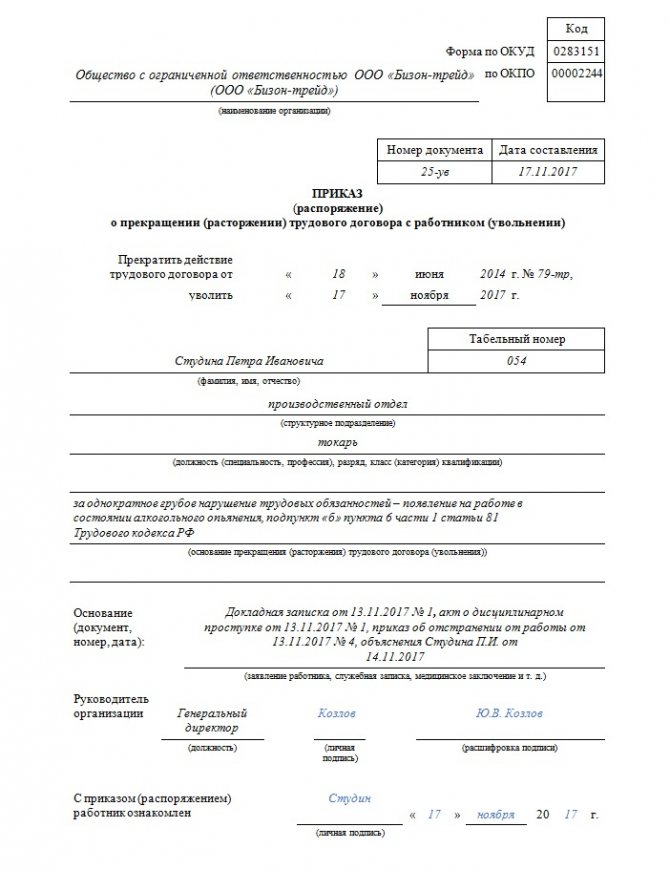
It is not necessary to issue two separate orders - on the imposition of a disciplinary sanction in the form of dismissal and on the termination of the employment contract. - The employer's order (instruction) to apply a disciplinary sanction is announced to the employee against signature within three working days from the date of its publication, not counting the time the employee is absent from work. The employer's responsibility is to provide the employee with the opportunity to familiarize himself with the contents of the order. At the same time, the employer has the right to do this in any form; it is not necessary to hand over the original order to the employee for review.
- If the employee refuses to familiarize himself with the specified order (instruction) against signature, then a corresponding act is drawn up. In judicial practice, the position has been established that the employer’s violation of the deadline for familiarizing the employee with the order to impose a disciplinary sanction is not a sufficient basis for declaring such an order illegal and canceling the penalty already applied to the employee.
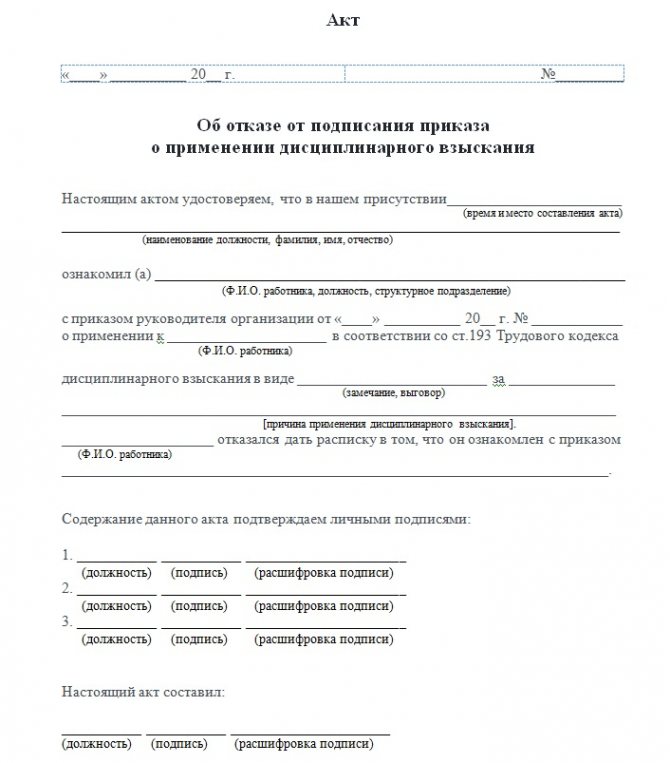
The period for appealing a disciplinary sanction in court is subject to calculation only from the moment when the employee could learn about the issuance of the order
Disciplinary responsibility of the manager
Bearing in mind that the decision to impose a disciplinary sanction is made by the head of the enterprise, a completely logical question arises - is it possible to hold the director of the organization accountable? Since the director, like any other employee of the enterprise, is obliged to comply with the rules established not only by legislative acts, but also by local documents (labor safety instructions, labor regulations within a legal entity, etc.). In addition, the manager must fulfill his functional responsibilities and implement the decisions of higher authorities. Therefore, in case of failure to comply with the requirements of labor discipline or negligent performance of official duties, the director may also be subject to disciplinary action.
This procedure can be initiated by the employees of the organization themselves through a representative body of employees (trade union committee) or the employer. The problem is that it is quite difficult to monitor how disciplined a manager is in fulfilling the requirements of labor discipline. The fact is that the specific nature of the work of most directors involves a traveling nature of the work. But it is quite simple to determine how well the director performs his functions by analyzing the accounting and statistical reporting of the organization.
For misconduct committed, the manager may be subject to standard types of disciplinary action - a reprimand, reprimand or dismissal. They are imposed by the owner of the organization or the employer.
Appealing a disciplinary sanction
A person has the opportunity to appeal decisions about his punishment.
So, to challenge it, you can take the statement of claim to court. The period is three months from the day the person received (or had the opportunity to receive) the results of the unlawful decision, and in case of dismissal - one month after receiving a copy of the order or work record book.
If an employee, appealing his dismissal for repeated failure to fulfill labor duties, refers to the illegality of one of the penalties, the court must verify the legality of such a penalty. Moreover, if the period for appeal has already expired, the company has the right to indicate this. If there were no valid reasons for missing the deadline, the court shall deny the claim on this basis.
It is also possible to file a complaint with the labor dispute commission within three months . This is a public body that has the competence to consider labor disputes on an equal basis with the courts. They can be created at the enterprise from the same number of authorized employees and employers.
Another option for asserting your rights is state control over the implementation of labor laws. It is carried out by the Federal Labor Inspectorate. This is a unified system consisting of a federal body and its territorial offices.
The State Labor Inspectorate is authorized to be independent in the restoration of workers' rights. If situations contrary to the law are detected (except for claims accepted for consideration by the court, or issues on which there is a court decision), the inspector issues an order to the enterprise, which must be complied with. But the organization can appeal it in court within ten days after receiving it.
At the same time, the law did not establish a time limit for citizens to contact the labor inspectorate. However, according to the courts, the period for applying to this body is also three months.
The appeal ruling of the Vologda Regional Court dated May 14, 2014 in case No. 33–2338/2014, the argument of the complaint of the state labor inspectorate that the law does not establish deadlines for citizens to apply for protection of a violated right to the state labor inspectorate, as well as deadlines for issuing the latter the relevant regulations mandatory for the employer were declared untenable.
If deadlines are missed for valid reasons, they can be restored for consideration by the appropriate authority.
Removal of disciplinary action
Exemption from the existing penalty occurs after a year. If during this time the offender has not committed another offense, he is recognized as having no penalties. This happens automatically; there is no need to issue any acts in this regard.
Additionally, the head of the organization can remove the penalty early on his own initiative, at the request of the employee himself, at the request of his immediate supervisor or a representative body of employees. In this case, it is necessary to issue an order in free form.
Removal of a disciplinary sanction is possible only in order to terminate the consequences of disciplinary liability, but not to apply a more severe type of penalty for the same violation.
Determination of the Tomsk Regional Court dated June 17, 2011 No. 33–1869/2011
Penalties removed early and repaid should not affect all kinds of personnel processes, even with new disciplinary proceedings.
Dismissal for repeated failure to fulfill labor duties without good reason is possible only if there is a disciplinary sanction previously applied to the employee, which has not been removed or extinguished at the time of repeated failure to fulfill labor duties. In addition, disciplinary sanctions that have been lifted and canceled cannot be taken into account when assessing the employee’s previous behavior and attitude towards work.
Removed or repaid penalties cannot be indicated in the characteristics, since the employee no longer has them.
The legislation does not provide for the removal of penalties when changing positions. Therefore, punishments received before the transfer, if they are not withdrawn or canceled, can be taken into account in the next disciplinary proceeding.
Early withdrawal
The action of a disciplinary sanction can be stopped before the expiration of the period established by the Labor Code of the Russian Federation:
- at the initiative of the organization's management;
- at the request of a trade union or manager (in the latter case, the manager must send a petition - presentation to a higher manager of the organization, obtain signatures and send the material to the Human Resources Department for drawing up an order);
- at the employee's request.
After the Order to lift a disciplinary sanction against an employee for high performance, impeccable discipline and other achievements is issued, the document must be given to the employee for signature.
It is important to correctly formalize the collection procedure under the Labor Code of the Russian Federation, otherwise the employer may have problems during the first inspection. In addition, the employee can apply to the State Tax Inspectorate or the court to restore the violated right, and in most cases the legislator will be on his side.
If you have any questions regarding the Labor Code of the Russian Federation, you should contact trusted specialists. International labor law lawyers will provide detailed advice on your issue. To contact a specialist, call 8 (800) 222-24-50, or order the service on the website rosco.su.
Peculiarities of applying disciplinary sanctions to certain categories of employees
In situations of dismissal of minors, there are a number of special points that need to be kept in mind. In order to terminate an employment contract with a minor (except for the liquidation of an organization or termination of the activities of an individual entrepreneur), it is necessary not only to ensure the entire dismissal procedure, but also to obtain the consent of the state labor inspectorate and the commission for minors. If this requirement is not met, the offender may be returned to work.
The law does not establish the procedure for this approval. You can send a free-form letter to the State Labor Inspectorate and the Commission, the text of which must contain information about the employee and the grounds for dismissal.
If a trade union member is dismissed (for example, for repeated failure to fulfill labor duties under existing penalties), the opinion of the elected body of the primary trade union organization must be taken into account.
It is impossible to terminate an employment contract at the initiative of the employer with pregnant women, except for the liquidation of the organization or termination of the activities of the individual entrepreneur.
At the same time, pregnant women are also obliged to ensure compliance with discipline. Their offenses can be recorded and available penalties can be used. After giving birth, management regains the opportunity to fire a woman for violating her duties. For example, it is possible to dismiss an employee who is formally on maternity leave for repeated misconduct, but there are conflicting court decisions on this matter.
The manager, along with ordinary employees, is subject to disciplinary action. The head of a company, exercising certain powers on its behalf (for example, concluding contracts), risks causing much greater damage to the enterprise compared to other members of the organization. Therefore, the law establishes additional responsibilities for management, for example, special reasons for dismissal.
The manager bears disciplinary liability on the grounds specified in paragraphs 5 and 6 of Art. 81 Labor Code of the Russian Federation. In addition, the Labor Code of the Russian Federation contains special grounds for disciplinary liability of a manager. These include the offenses listed in paragraphs 9 and 10 of Art. 81 of the Labor Code of the Russian Federation, as well as in Art. 195 Labor Code of the Russian Federation.
The employer has the opportunity to hold the manager accountable: the owner, the bodies of the legal entity (general meeting or board of directors) or persons authorized by the management bodies of the legal entity.
An employer may dismiss the head of an organization (branch, representative office) as a disciplinary measure on the basis of clause 9 of Art. 81 of the Labor Code of the Russian Federation for making an unfounded decision that entailed a violation of the safety of property, its unlawful use or other damage to the organization’s property. This basis can be extended to the deputy and chief accountant of the organization.
There is a dual character in the disciplinary responsibility of a manager. On the one hand, the employer usually makes the decision himself whether it is necessary to punish a subordinate for this or that action or whether he can turn a blind eye to some mistakes. On the other hand, Article 195 of the Labor Code of the Russian Federation obliges the imposition of a penalty on the company’s management (and even dismissal) if the inconsistencies of the actions of the management level, declared by the representative body, with labor legislation and other regulations are proven.
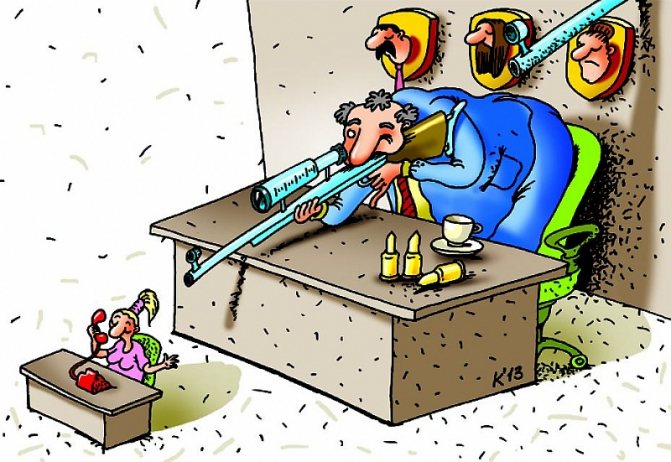
The manager is responsible on a general basis for committing disciplinary offenses that do not directly violate the rights of other employees, the only exception being dismissal
The heads of the organization (branch, representative office), as well as his deputies, may be subject to disciplinary action in the form of dismissal, in accordance with clause 10 of Art. 81 of the Labor Code of the Russian Federation, for a one-time gross violation of one’s labor duties, for example, violation of labor protection rules, leading to harm to the health of workers and material damage, or abuse of official authority, use of them for personal gain, etc.
When dismissing representatives of the management team, it is necessary to remember that Article 3 of the Labor Code of the Russian Federation prohibits restrictions on someone’s rights and freedoms due to their official position.
Legal consequences of a reprimand for an employee at work
According to Art. 66 of the Labor Code of the Russian Federation, data on the reprimand are not recorded in the work book. As a last resort, the personnel service may (but is not obligated to) enter information about the reprimand into the employee’s personal card, which is an internal document. So the new employer, as well as any other entity, most likely will not know that any disciplinary action has been taken against the person.
This means that from the point of view of relations with the new employer (or some other persons legally independent of the current employer), the presence of a reprimand at work will not have significant legal consequences for the employee.
But the employee may be interested in maintaining his current job. And in this case, it will be useful for him to pay attention to one nuance.
In accordance with paragraph 5 of Art. 81 of the Labor Code of the Russian Federation, the employer has the right to dismiss an employee if he repeatedly fails to fulfill his official duties. This includes an offense for which the employee was reprimanded. The nuance is that the employer can use the following interesting mechanism for applying the norms of paragraph 5 of Art. 81 of the Labor Code of the Russian Federation, taking into account the provisions of Art. 193 of the Labor Code of the Russian Federation, establishing a one-month period for issuing disciplinary sanctions.
Having discovered an employee’s misconduct, the employer can, according to the established scheme, reprimand him and immediately issue a new order - for some other offense within a month’s prescription (if, of course, there was such an offense).
It turns out that the employer will have 2 proven facts of violation of labor discipline and he will immediately have the right to dismiss the employee. So employees who have once committed an offense to which the employer seems to have turned a blind eye should not provoke their superiors to impose an official disciplinary sanction - it may have direct legal consequences for them in the form of dismissal.




